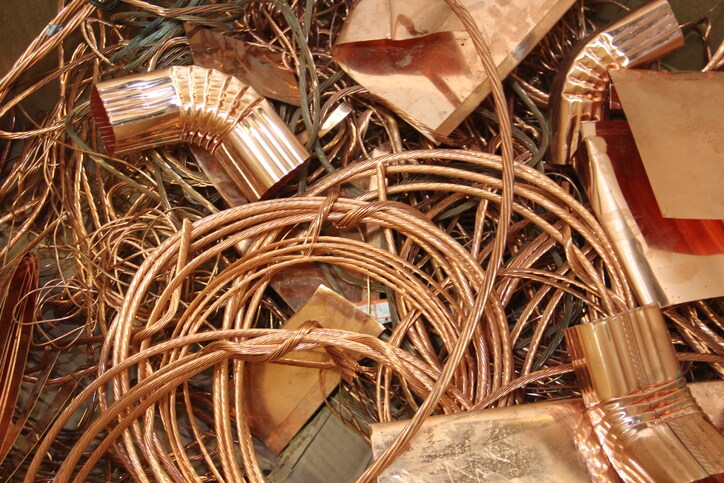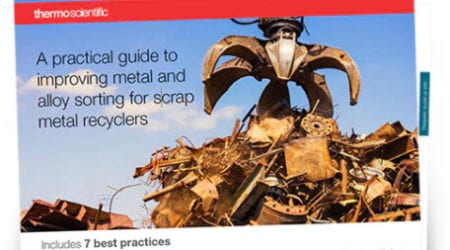 According to a large insurance company website, metal theft is one of the fastest growing crimes in the country because copper, aluminum, nickel, stainless steel and scrap iron have become the desired target of thieves looking to make a quick buck. The company cites copper as a particular concern because it can be quickly removed from vacant or closed buildings. The thieves just need to strip the wiring, flashing, gutters, and HVAC systems and quickly sell it to scrap yards.
According to a large insurance company website, metal theft is one of the fastest growing crimes in the country because copper, aluminum, nickel, stainless steel and scrap iron have become the desired target of thieves looking to make a quick buck. The company cites copper as a particular concern because it can be quickly removed from vacant or closed buildings. The thieves just need to strip the wiring, flashing, gutters, and HVAC systems and quickly sell it to scrap yards.
Over the past several years, we have written articles about metal theft that involved copper wire from electrical infrastructure or even power lines, metal railroad tracks, church bells, pieces of airport runways, air conditioners, beer kegs, manhole covers, statues, and an ever-increasing list of items containing metal, in particular, copper.
The majority of these crimes are driven by the high price of copper and many are perpetrated by people looking to sell the metal to support drug habits. The U.S. Department of Justice Office of Community Oriented Policing Services wrote in their “Theft of Scrap Metal” guide that to support their drug habits, addicts require repeated and quick access to small amounts of cash, which they can easily obtain by selling small amounts of stolen metal to scrap metal dealers.
At one point, the theft of catalytic converters seemed to be continually in the news. Analysis of these auto parts using x-ray fluorescence (XRF) technology has revealed that they contain platinum group metals. Catalytic converters are pollution control devices coated with chemicals and a combination of platinum (Pt), rhodium (Rh) or palladium (Pd). Catalytic converter recycling plays a significant part in the effort to feed the constant demand for platinum from the automotive and other transportation industries that make these devices. If there’s a demand, you can be sure there will be theft.
The insurance website article goes on to say that to “combat metal theft, more and more states and municipalities have passed laws tightening the restrictions on scrap dealers. In some instances, purchases of scrap metal are required to be held in reserve for a week or more before being resold in case they have been stolen. In other instances, states require dealers to record the seller’s name, address and driver’s license.”
A Texas county sheriff was interviewed by the online news site, Odessa American, and described how the theft of copper-related items was reduced significantly after Texas got more aggressive in enforcing compliance of the Texas Occupations Code, Chapter 1956.
According to the Texas Department of Public Safety (DPS) website, “Anyone operating as a Metals Recycling Entity (MRE) in Texas is required to register with DPS, to comply with Texas Occupations Code, Chapter 1956. An MRE is ‘a business predominantly engaged in performing the manufacturing process by which scrap, used, or obsolete metal is converted into raw material products consisting of prepared grades and having an existing or potential economic value, by methods including processing, sorting, cutting, classifying, cleaning, baling, wrapping, shredding, shearing, or changing the physical form of that metal.’”
If you operate an MRE in Texas, you are required to collect certain identifying information from sellers of regulated materials to assist law enforcement with monitoring those who are buying and selling regulated materials.
A lieutenant in the Sheriff’s office is quoted in the article as saying:
“We monitor all the regulated metal sales pretty closely…. We look at the Texas metals online registration program. Any time these scrap yards buy brass, copper, aluminum and other related metals, they have to report it to the state. We can go in and look at the data base and see who is selling this stuff….
“By the habits, we can pretty much tell if we are dealing with someone who is selling stolen copper or stolen materials or if it is legitimate.”
The Institute of Scrap Recycling Industries (ISRI) is trying to help by offering ScrapTheftAlert.com, a tool for law enforcement that allows you to alert the scrap industry of significant thefts of materials in the United States and Canada. Upon validation and review, alerts you post are broadcast by email to all subscribed users within a 100-mile radius of where the incident occurred. (Note that all thefts should also be reported to law enforcement.) According to their website, at this writing they have helped recover property in the amount of $3,259,278.
The insurance company website offers tips as to how to help prevent metal theft at the scrapyard, including installing cameras, securing building and yard access with locks, motion detectors, and alarms, and removing shrubbery where criminals could hide. Also, make sure you know what’s in your scrapyard – both as part of your operations and of your material supplies. If theft occurs, it’s easier to report if you have already created a list with pictures of your equipment and bulk metal.
Scrap metal recyclers should also be sure of what they are buying and selling. What is the exact chemical composition of the scrap—including the existence of contaminants or hazardous elements. If the scrap was stolen from a hospital, labor, or manufacturing facility, it could contain a radiation source. If the origination of the scrap is uncertain, quality, safety, and regulatory compliance are at risk. To help ensure product integrity, scrap metal operations should utilize handheld X-ray fluorescence (XRF) analyzers for accurate, reliable material identification of the metal and the alloys contained in the material – and also scrap monitoring systems that can monitor vehicles entering the scrap yard for radiation.
Let’s hope that by monitoring the scrap metal thefts, we can reduce the number of incidents and make a dent in the drug crisis.






iam interested screp metal
It’s really alarming to know that thieves can easily acquire copper wires and sell them to scrap yards. Fortunately for us, all of our scrap metals are from old appliances that can be useful once recycled. I just hope that there will be interested buyers for this material since we really have a lot of them stored in the basement.
I didn’t know that demand for platinum from the automotive industry comes from recycling catalytic converters. I actually have one or two left over in my garage from when my dad and I used to work on cars. I’ll look into getting them recycled this weekend so I can help out the environment.
Thank you
I will buy Aluminium Scrap
Protection of the environment and preserving natural resources is a major reason to use recycled metal.
I will try to avoid metal theft when I go to a scrapyard. I’d like to go to a scrapyard that has this protection. So I’ll need to ask around and find a trustworthy one.